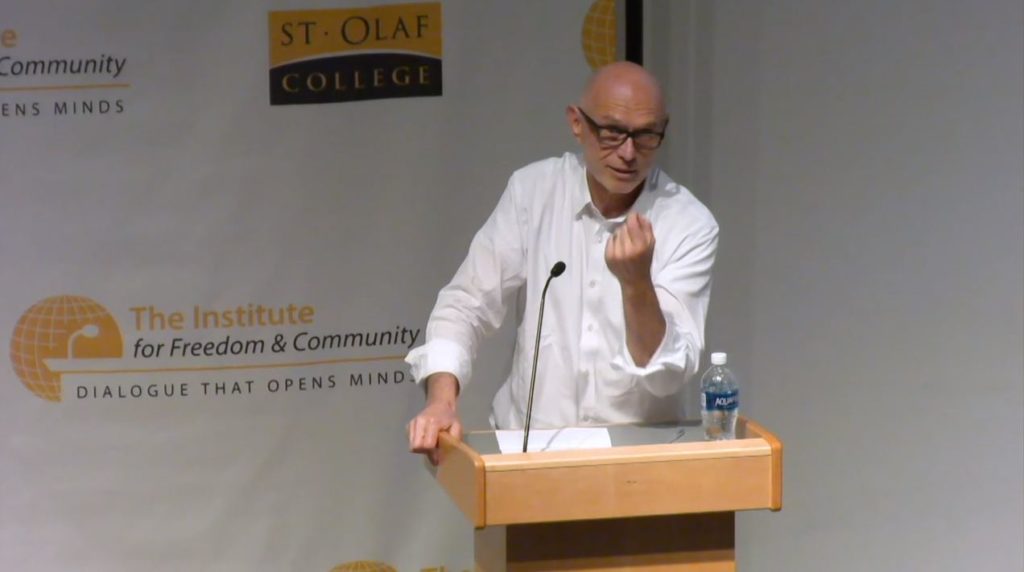Miroslav Volf spoke at the St. Olaf College Two-Day Symposium on Religious and Political Disagreement. Volf focused on negotiating difference without sacrificing one’s identity in a pluralistic society. Globalization continues to increase causing a more pluralistic society, thus different religions and philosophies conflict. Volf proposed a compromise by “exercising wisdom” between varieties of thought. He stated, “Wisdom helps to figure out negotiations in a pluralistic world.” Volf called on individuals to learn how to live in a common space even though they hold religious differences.
Volf earned doctoral and post-doctoral degrees from the University of Tuebingen, Germany. He is currently a professor at Yale and the Founder and Director of Yale Center for Faith and Culture. This talk drew from his recent book, Flourishing: Why We Need Religion in a Globalized World. During his speech, Volf particularly explained how Christians should live in society with Contending Particular Universalisms or CPUs.
Each religion naturally causes division among individuals. Volf explained that religion, similar to language, is a “maker of identity.” He continued: “Each religion is an articulation of a vision of human fullness, a way to live into what we as human beings are meant to be.” The end goal of humanity is to promote human flourishing, thus the means to achieve this end is often found in various religions and philosophies, according to Volf.
Volf explained that Contending Particular Universalisms (CPU) can be religion, philosophy, or even atheistic. They are truth claims being made about the nature of the self, good, and creation. Volf noted universalisms are particular which leads to consequences in society because each has a particular means to human flourishing. These universalisms, such as Islam, Christianity, and Buddhism, are always contending each other intellectually. Volf warned truth claims can lead to violence, but not always.
Therefore, Volf acknowledged the challenge is how to manage these CPUs. Volf said he did not believe that society can create a homogeneous base because it will have a secularizing effect. Thus, Volf argued that exclusive religious faiths can embrace pluralism, like Christianity does. He said John Winthrop’s and Roger Williams’ different interpretations of religion in society were compatible. Williams promoted religious liberty for all, while Winthrop strove for an exclusive Christian community. “Christian faith can be embraced in an exclusive way and just because of that affirm pluralism as a political project,” Volf stated.
Volf was asked the obvious question, how absolutes can each exist if they undermine other particular philosophies. Volf pushes against “the idea of absoluteness in order to preserve transcendences, to preserve that God is beyond one’s ability to articulate.” Overall, Volf said he did not believe that one should bring absolute truths into politics. However, different universalisms should bring their beliefs into the public square. Volf stated, “Any witness to the wisdom ought to listen to other voices of wisdoms.” Therefore, one can still evangelize by both “bearing witness and receiving witness.”
Volf’s theory of negotiating difference is promising and hopeful, however, it is probably not realistic. Volf expects individuals to separate their identities with a certain religion or philosophy when engaging in the public square. For example, it would be difficult not to believe in an absolute while claiming to be a follower in Christ and embracing traditional Christian doctrines. Volf also seems to want to pick and choose which truth claims in different beliefs are the best means to achieve the end goal of human flourishing. While Volf’s intentions of securing religious liberty in a pluralistic society are admirable, his vision of promoting Contending Particular Universalisms is likely an unattainable means of doing so.





Comment by MikeS on June 20, 2017 at 9:17 pm
“Volf expects individuals to separate their identities with a certain religion or philosophy when engaging in the public square.”
Has anyone asked the Islamic bombers and decapitators if they might be interested in submerging their religious opinions in order to foster a peaceful public square?
Comment by Rebecca on June 23, 2017 at 11:05 pm
I don’t think Volf’s theory can work because of the nature of wisdom. Wisdom is the understanding of what is true, right, or lasting. There aren’t any universalisms in wisdom, and at least one of the above named religions doesn’t believe in the biblical concept of right.
Comment by T E McWhertor on July 1, 2017 at 9:49 pm
I was not present at Volf’s presentation, but based on reading many of his published works, I would wonder how he would rate the reviewer’s shallow depiction of his own tightly argued and highly nuanced perspective on holding our firmly held faith-perspectives and contending for them while fully engaging other perspectives in our pluralistic society -and world.